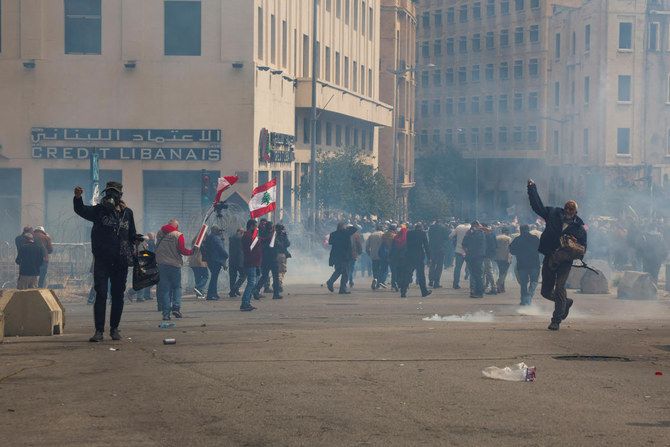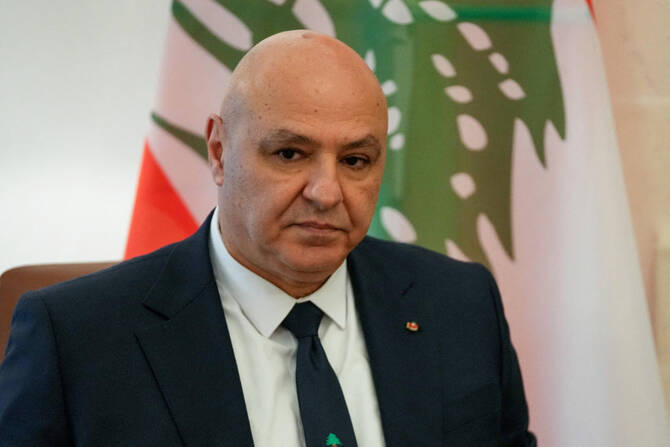Their angry demonstration followed the latest sharp decline in the value of the Lebanese pound on Tuesday, which prompted calls on social media for civil disobedience and public protests. Many of the protesters carried Lebanese flags and placards denouncing the government and its financial policies.
“Where is the conscience of the ruling powers?” said one of the demonstrators Arab News spoke to.
“Don’t they feel guilty about the retired members of the military who have served their country all their lives, given that they are currently starving and not able to access medical care services? Hospitals are holding their bodies in morgue freezers because their families cannot afford the hospital bills.”
Another retired military man told Arab News: “Retired soldiers are now paid peanuts amid the sharp increase in the dollar exchange rate and the dollarization of food prices.
“We need international protection to save us from corrupt politicians. We are no longer able to secure our food. We do not follow any political party or militia. We only belong to our homeland. They are criminals, endangering their country. Let it be known that the people will have no mercy on the tyrants.”
The drastic collapse of the exchange rate of the Lebanese pound against the dollar means that the value of monthly salaries paid to retired military personnel, and public-sector workers, has fallen to between $20 and $60.
“We came to discover whether there is still any state and to claim our salaries and rights to medical care with dignity,” retired Brig. Gen. Chamel Roukoz told Arab News: “The state has a duty toward us. Taking to the streets was our only solution.”
The protesters refused to meet any representatives of the Forces of Change, new members of parliament who were elected last year with the promise of representing the popular mood of opposition to the political status quo, because “they did nothing to benefit the people.” They said that MP Paula Yacoubian and the activist Wassef Al-Harakeh had been expelled from the demonstration.
The protesters breached barbed wire fences surrounding the Grand Serail, the headquarters of caretaker Prime Minister Najib Mikati, and declared their intent to break in. In response, security and riot control officers used tear gas to disperse the crowd. The majority of the protesters were elderly and a number were treated by the Red Cross for suffocation.
“Wouldn’t it be better if they had given hungry soldiers money instead of spending it on bombs?” said one injured demonstrator.
Later, the protesters met Mikati and warned of “an unprecedented escalation if promises to fulfill the demands are not met, notably paying the public sector and retirees’ salaries based on the Sayrafa platform’s exchange rate, which is 25,000 pounds against the dollar, instead of the current rate of 90,000 pounds.”
In a separate incident, in the Jnah neighborhood in the southern suburbs of Beirut, fishermen blocked a road in protest against their deteriorating financial situation.
Elsewhere, members of an association that represents public administration employees protested in front of the Finance Ministry, demanding that the government “give public sector employees their rights by revising their salaries and transportation allowance, and securing their healthcare and education grants.”
Similar protests took place in Sidon, Tyre and Nabatieh.
An International Monetary Fund delegation, headed by Ernesto Rigo Ramirez, on Wednesday met the Saudi ambassador to Lebanon, Walid bin Abdullah Bukhari. Embassy sources said that they discussed “the (overall) developments and conditions needed for Lebanon to recover from the political and economic crisis, in addition to issues of common concern.”
Meanwhile, in an address to the nation at the start of the Muslim holy month of Ramadan, Grand Mufti Sheikh Abdul Latif Deryan warned of “the emerging chaos whose price will be paid by citizens.” It is necessary to “resort to the constitution immediately, elect a president and stop wasting time,” he said.
“We cannot wait any longer; people have started to lose the basic necessities of life, and the political class and citizens live in two different worlds,” he added.






















